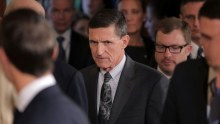Justice Department watchdog investigating FBI decisions in Clinton email probe
Updated
The US Justice Department said it would probe an FBI decision to announce it was reopening an inquiry into Hillary Clinton's emails shortly before the November presidential election, a move she has blamed as a factor in her defeat.
Key points:
- Part of the probe will focus on public statements by FBI Director James Comey
- Hillary Clinton said Mr Comey was partially at fault for her loss
- Donald Trump will not have power to dismiss the probe when he takes office
The Justice Department's Office of Inspector General said its probe would focus in part on decisions leading up to public statements by FBI Director James Comey regarding the Clinton investigation and whether underlying investigative decisions may have been based on "improper considerations".
Inspector General Michael Horowitz, the department's internal watchdog, will direct the investigation, which comes in response to requests from members of Congress and the public.
Mr Comey said he was pleased about the review and the FBI would cooperate fully with the Inspector General.
"I hope very much he is able to share his conclusions and observations with the public because everyone will benefit from thoughtful evaluation and transparency regarding this matter," Mr Comey said in a statement.
The controversy involved Mrs Clinton's use of a private email server for official correspondence when she was secretary of state under President Barack Obama, including for messages that were later determined to contain classified information.
Mrs Clinton said Mr Comey was at fault for her loss after he decided to send a letter to Congress only days before the election announcing he was reinstating an investigation into whether she mishandled classified information when she used the private email server.
"There are lots of reasons why an election like this is not successful," Mrs Clinton told top donors on a farewell conference call, The Washington Post reported.
"But our analysis is that Comey's letter raising doubts that were groundless, baseless, proven to be, stopped our momentum."
Although the FBI ultimately decided not to refer Mrs Clinton's case for prosecution, Mr Comey aroused suspicion that may have diminished trust in Clinton among voters.
Often leading crowds in chants of "Lock her up!" during the election campaign, President-elect Donald Trump as a candidate repeatedly accused Mrs Clinton of illegal conduct over the emails.
In a debate in October, he vowed she would "be in jail" over the matter if he became president, but he has since said he would not pursue prosecution.
 Photo:
The FBI ended the investigation only days prior to election day. (Reuters: Brian Snyder, file)
Photo:
The FBI ended the investigation only days prior to election day. (Reuters: Brian Snyder, file)
'Crying out for an independent review'
Mr Comey publicly announced the status of the agency's investigation into Clinton's emails two times in 2016.
In July, Mr Comey held a press conference and testified before Congress to explain why the FBI had decided not to refer Mrs Clinton for prosecution, explaining that she was "extremely careless" but should not be charged with gross negligence or any other federal crime.
In October, less than two weeks before the November 8 election, Mr Comey said the FBI was resuming the investigation because of new emails found on the computer of disgraced former Representative Anthony Weiner, the husband of one of Mrs Clinton's top aides.
On November 6, Comey said the investigation into Mr Weiner's computer produced no new evidence that would incriminate Mrs Clinton.
Brian Fallon, Mrs Clinton's spokesman, told MSNBC that Mr Comey's actions "cried out for an independent review".
It is the usual practice of prosecutors and law enforcement, including the FBI, not to disclose information about investigations that do not end in criminal charges.
Asked about the probe, the White House said the review, like any by a government inspector general, was an independent decision.
Mr Trump, who will be sworn in January 20, will not have the power to dismiss the probe. But it is within presidential authority to appoint or dismiss inspectors general for federal agencies.
Critics of Mr Comey's decisions also said he could be in violation of the Hatch Act, a 1939 law that bars government employees from interfering with US elections.
The Inspector General's announcement said the review would not consider whether the FBI or the Department of Justice made right decisions in not charging Mrs Clinton.
 Photo:
Hillary Clinton lost the election, despite nearly every poll tipping her as the favourite. (Reuters: Carlos Barria)
Photo:
Hillary Clinton lost the election, despite nearly every poll tipping her as the favourite. (Reuters: Carlos Barria)
Wires/ABC
Topics: government-and-politics, world-politics, us-elections, united-states
First posted







